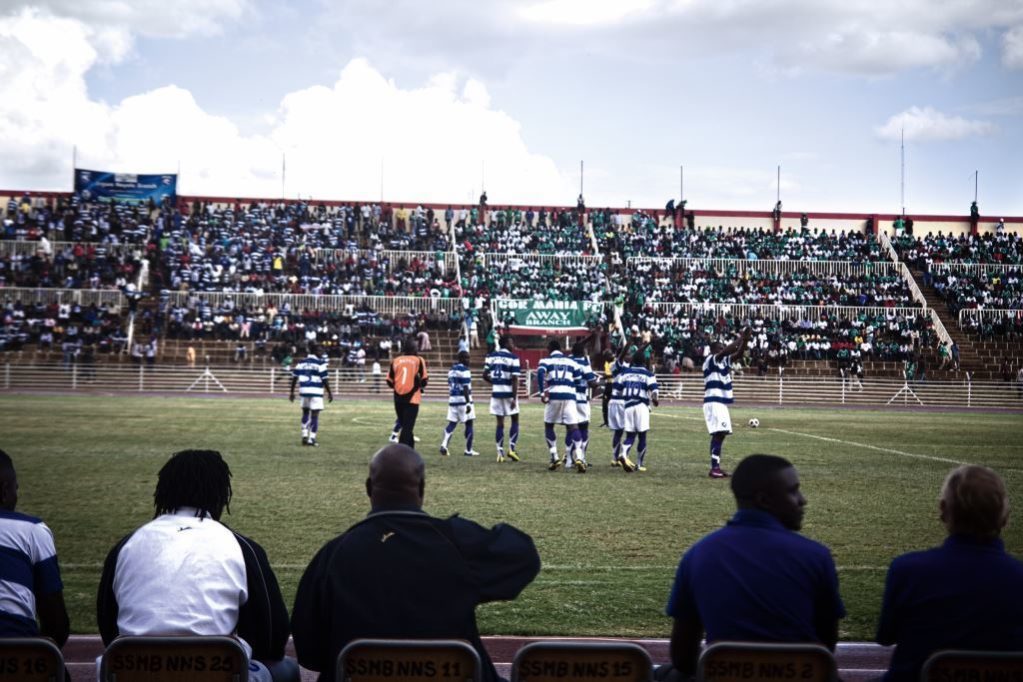On March 18, football fans in green and white T-shirts flocked to Kenya’s Nyayo National Stadium to watch the country’s two major clubs playing. But 25 minutes from the end of the game, the referee stopped the match between Gor Mahia and AFC Leopards after fans threw plastic bottles onto the field in protest against one of his decisions.
While condemning the incident, a radio presenter had this to say: “We did not wish them to be unruly, but at least we have fans inside the stadium. That’s a good sign.” The match was sold out.
For the last decade, the country’s sport has been in chaos. Rival federations each ran their own leagues; football chiefs were corrupt, inefficient and ranked high on the list of people Kenyans hated most. A crowd of 100 at a match was considered an achievement. At one point, FIFA banned Kenya from international football after the minister of sports disbanded the Kenya Football Federation (KFF). The body was then charged with running the sport. In 2007, Kenya’s football hit rock bottom as the country’s FIFA ranking fell to 115.
Players in most clubs went for months without pay, resorting to manual work to pay their bills. Pessimism filtered into the national team, which did not qualify for the African Cup of Nations. This was hard to bear for a country that loves football so much that a fan committed suicide after Arsenal’s 2009 Champions League defeat.
But the last few years have seen a football revival. The rivalry between KFF and Football Kenya Limited (FKL) ended when FIFA gave FKL the mandate to run the sport. Recently elections ushered in a team under the banner of Football Kenya Federation (FKF). Then 16 clubs broke away from the squabbling factions to form the Kenya Premier League Limited, which runs the local league. It is owned by the clubs, the federation and representatives of other football stakeholders.
It’s the best decision the clubs could have made. Companies are pouring money into the sport, fans are flocking to the stadiums and footballers are competing for attention with hip-hop artists in the gossip columns.
The sport is also attracting new investors. SuperSport, the South Africa headquartered pay channel has paid $12 million to air KPL matches in a deal expected to run until 2015. SuperSport’s head of Africa, Gary Rathbone, says they spend close to $43,000 a match to air more than 100 games on the channel each season.
“Kenyans love football, so when management got its act together, it was natural for us to partner with them,” says Rathbone. The station has trained more than 20 Kenyans to work in the production department.
Danish investors have also moved in for a piece of the pie. In March last year, they invested $93,000 in futaa.com, a football website that had recorded 1.6 million hits by the end of March this year.
“Our investment in football was because of the opportunity that presented itself. There was no credible site to provide information on players and other important data,” says chief editor at futaa.com, Patrick Korir.
Local business is getting involved too. East African Breweries has forked out $1.3 million to sponsor the national team. This is in addition to the amount it spends on Tusker, its KPL club and top of the league last year. It follows Mumias Sugar, Tuzo and East African Portland Cement, which have spent a total of over a million dollars to sponsor teams at KPL.
The rise of football has also encouraged entrepreneurs. Congolese millionaire Elly Kalekwa has invested millions in Sofapaka, a team that won the league in its debut in 2009. Nkaari Martin, a businessman in his early 20s, won funding to expand Ticket Masters, a firm that had the monopoly to sell match tickets last season.
“In 2007, I attended a league game that had 37 spectators. More than 100,000 tickets were sold last year,” says Korir.
And, players are now being paid for their efforts. Internationals like MacDonald Mariga and Dennis Oliech have inspired local footballers with their flashy rides and bevvies of beauties. Others like Allan Wanga have taken the game a notch higher. Wanga launched a book in March this year at an event attended by Prime Minister Raila Odinga.
Despite these gains, hurdles remain. Rathbone says stadiums need to be improved to meet international standards. Only two are qualified to host international matches and one of them is under repair.
“Our football is still mainly political, so our fortunes will remain scant until the day we hit equilibrium between business and politics. Then, business sense will take over,” says Martin.
“And we need to develop our structures, like a young under-19 team,” says Korir. Fans hope the national team, which has not won a major trophy in seven years, can replicate the success at club level.
Though there is still disagreement, this much those on opposing sides recognize: Kenya’s football is no longer scoring an own goal. That is a good start.
